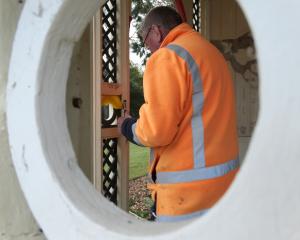The North Otago Irrigation Company has paid back more of the $10 million loan from the Waitaki District Council and is planning major expansion of the scheme to fund the rest.
The expansion will be the biggest since the scheme was built and opened in October, 2006, at a cost of about $65 million.
Now with $73 million in irrigation infrastructure, including the recent $2 million expansion to Five Forks, the scheme is irrigating about 14,000ha with water from the lower Waitaki River, pumped and distributed on the North Otago downlands, Waiareka and Kakanui Valleys.
On Thursday, the company paid back $286,000 against the loan made by the council in 2006 to provide enough infrastructure to ensure a second stage of 10,000ha could be irrigated. It was the seventh repayment, bringing the total paid to about $2.4 million.
So far, 1686 out of 10,000 shares have been issued in stage 2. Another 300 are under agreement but still to be issued.
Company chief executive Robyn Wells said that represented about 60% of the total 20,000 available shares in both stages of the scheme.
Major investment was now required to enable the final 8000 shares to be put on the market.
''We are meeting with small groups of land owners in the expansion area to gauge their interest in irrigation and all the signs to date are very positive,'' Ms Wells said.
The company had a $381 grant from the Ministry for Primary Industries Irrigation Acceleration Fund to help design, legal and planning work, all leading to a formal offer to the market in late 2014.
''We are confident we will put forward the best possible case we can for the farmers' consideration,'' she said.
Waitaki Mayor Gary Kircher said the latest developments showed how co-operation between the council and the company had substantial benefits for the community as a whole.
''This venture is the single most significant investment in economic development that the council has been involved in,'' he said.
The vision of the council was to support local initiatives that benefitted the entire community.
''With more people working on the land it helps our schools, medical services, social services and more.''
The $10 million loan was made to enable the company to fund irrigation infrastructure during the Stage 1 build for the benefit of Stage 2 irrigators. When fully complete, the scheme will provide water to about 26,000 hectares of land.
As a requirement of the loan agreement, the company was required to repay $1000 plus a pro-rata proportion of the accrued interest as each Stage 2 share was issued.




